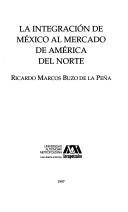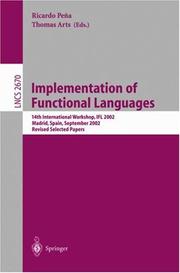Digital
ISBN: 9783642324956 Year: 2012 Publisher: Berlin, Heidelberg Imprint: Springer
Abstract | Keywords | Export | Availability | Bookmark
 Loading...
Loading...Choose an application
- Reference Manager
- EndNote
- RefWorks (Direct export to RefWorks)
Logic --- Complex analysis --- Computer science --- Programming --- Computer architecture. Operating systems --- Computer. Automation --- complexe analyse (wiskunde) --- informatica --- ontwerpen --- computerbesturingssystemen --- programmeren (informatica) --- programmeertalen --- software engineering

ISBN: 9706541004 Year: 1997 Publisher: México, D.F. Universidad Autónoma Metropolitana
Abstract | Keywords | Export | Availability | Bookmark
 Loading...
Loading...Choose an application
- Reference Manager
- EndNote
- RefWorks (Direct export to RefWorks)
International economic relations --- Mexico --- United States of America
Book
ISBN: 1280944242 9786610944248 1846288991 1846288983 1849966702 Year: 2007 Publisher: London : Springer,
Abstract | Keywords | Export | Availability | Bookmark
 Loading...
Loading...Choose an application
- Reference Manager
- EndNote
- RefWorks (Direct export to RefWorks)
While automatic control and system identification have evolved very rapidly in recent years, there is still an important disjunction between the ideas in theoretical texts and what goes on in real plant. There are very few, if any, situations in which "out-of-the-box" theory fits practical application without simplification and adjustment. This mismatch is important, especially in safety-critical applications and is usually compensated by extensive simulation and/or experimental testing. Identification and Control meets the difficulty of making practical use of new systems theory head on, presenting a selection of varied applications together with relevant theory. The highly-experienced groups of researchers and engineers contributing to this volume show how workable identification and control solutions can be derived by adapting and extrapolating from the theory. Each chapter has a common structure: a brief presentation of theory, extensively cited throughout the chapter; the description of a particular application; experimental results; and a final section highlighting, explaining and laying out solutions to the discrepancy between the theoretical and the practical. The extensive list of applications used as examples includes: mine planning, suspension polymerization, copper founding, magnetic bearings, electromechanical systems, aircraft flight, active noise control, sewer networks, flexible structures, active suspension and active vision. Identification and Control faces a well-known but often-evaded problem squarely and helps it readers to prevail against it. This collection is written for researchers interested in the application of control theory and for engineers who want to make use of new ideas in identification and control.
Automatic control. --- Engineering. --- Construction --- Industrial arts --- Technology --- Control engineering --- Control equipment --- Control theory --- Engineering instruments --- Automation --- Programmable controllers --- Chemical engineering. --- Industrial engineering. --- Vibration. --- Environmental pollution. --- Industrial Chemistry/Chemical Engineering. --- Industrial and Production Engineering. --- Control, Robotics, Mechatronics. --- Vibration, Dynamical Systems, Control. --- Waste Water Technology / Water Pollution Control / Water Management / Aquatic Pollution. --- Chemical pollution --- Chemicals --- Contamination of environment --- Environmental pollution --- Pollution --- Contamination (Technology) --- Asbestos abatement --- Bioremediation --- Environmental engineering --- Environmental quality --- Factory and trade waste --- Hazardous waste site remediation --- Hazardous wastes --- In situ remediation --- Lead abatement --- Pollutants --- Refuse and refuse disposal --- Cycles --- Mechanics --- Sound --- Chemistry, Industrial --- Engineering, Chemical --- Industrial chemistry --- Engineering --- Chemistry, Technical --- Metallurgy --- Management engineering --- Simplification in industry --- Value analysis (Cost control) --- Environmental aspects --- Production engineering. --- Control engineering. --- Robotics. --- Mechatronics. --- Dynamical systems. --- Dynamics. --- Water pollution. --- Aquatic pollution --- Fresh water --- Fresh water pollution --- Freshwater pollution --- Inland water pollution --- Lake pollution --- Lakes --- Reservoirs --- River pollution --- Rivers --- Stream pollution --- Water contamination --- Water pollutants --- Water pollution --- Waste disposal in rivers, lakes, etc. --- Dynamical systems --- Kinetics --- Mathematics --- Mechanics, Analytic --- Force and energy --- Physics --- Statics --- Mechanical engineering --- Microelectronics --- Microelectromechanical systems --- Machine theory --- Manufacturing engineering --- Process engineering --- Industrial engineering
Book
ISBN: 9783642324956 Year: 2012 Publisher: Berlin, Heidelberg Springer Berlin Heidelberg
Abstract | Keywords | Export | Availability | Bookmark
 Loading...
Loading...Choose an application
- Reference Manager
- EndNote
- RefWorks (Direct export to RefWorks)
This book constitutes the refereed post-proceedings of the Second International Workshop on Foundational and Practical Aspects of Resource Analysis, FOPARA 2011, held in Madrid, Spain, in May 2011. The 8 revised full papers were carefully reviewed and selected from the papers presented at the workshop and papers submitted following an open call for contributions after the workshop. The papers are organized in the following topical sections: implicit complexity, analysis and verfication of cost expressions, and worst case execution time analysis.
Logic --- Complex analysis --- Computer science --- Programming --- Computer architecture. Operating systems --- Computer. Automation --- complexe analyse (wiskunde) --- informatica --- ontwerpen --- computerbesturingssystemen --- programmeren (informatica) --- programmeertalen --- software engineering
Book
ISBN: 1450321542 Year: 2013 Publisher: [Place of publication not identified] ACM
Abstract | Keywords | Export | Availability | Bookmark
 Loading...
Loading...Choose an application
- Reference Manager
- EndNote
- RefWorks (Direct export to RefWorks)
Book
ISBN: 9783540278610 Year: 2004 Publisher: Berlin, Heidelberg Springer-Verlag Berlin/Heidelberg
Abstract | Keywords | Export | Availability | Bookmark
 Loading...
Loading...Choose an application
- Reference Manager
- EndNote
- RefWorks (Direct export to RefWorks)
Functional programminghas a long history,reaching back through early reali- tions in languages like LISP to foundational theories of computing, in particular ?-calculus and recursive function theory. In turn, functional programming has had wide in?uence in computing, both through developments within the dis- pline, such as formal semantics, polymorphic type checking, lazy evaluation and structural proof, and as a practical embodiment of formalized approaches, such as speci?cation, transformation and partial application. One of the engaging features of functional programming is precisely the crossover between theory and practice. In particular, it is regarded as ess- tial that all aspects of functional programming are appropriately formalized, especially the speci?cation and implementation of functional languages. Thus, specialist functional programming events like the International Workshop on the Implementation of Functional Languages (IFL) attract contributions where strong use is made of syntactic, semantic and meta-mathematical formalisms to motivate, justify and underpin very practical software systems. IFL grew out of smaller workshops aimed at practitioners wrestling with the nuts and bolts of making concrete implementations of highly abstract l- guages. Functional programming has always been bedeviled by an unwarranted reputation for slowand ine?cient implementations. IFL is one venue where such problemsaretackledheadon,alwaysusing formaltechniques to justify practical implementations.
Digital
ISBN: 9781846288999 Year: 2007 Publisher: London Springer-Verlag London Ltd
Abstract | Keywords | Export | Availability | Bookmark
 Loading...
Loading...Choose an application
- Reference Manager
- EndNote
- RefWorks (Direct export to RefWorks)
Classical mechanics. Field theory --- Applied physical engineering --- Water supply. Water treatment. Water pollution --- Engineering sciences. Technology --- Artificial intelligence. Robotics. Simulation. Graphics --- Computer. Automation --- procesautomatisering --- BIT (biochemische ingenieurstechnieken) --- automatisering --- waterverontreiniging --- KI (kunstmatige intelligentie) --- ingenieurswetenschappen --- dynamica --- regeltechniek --- AI (artificiële intelligentie)
Dissertation
Year: 1996
Abstract | Keywords | Export | Availability | Bookmark
 Loading...
Loading...Choose an application
- Reference Manager
- EndNote
- RefWorks (Direct export to RefWorks)

ISBN: 3540448543 3540401903 Year: 2003 Publisher: Berlin, Heidelberg : Springer Berlin Heidelberg : Imprint: Springer,
Abstract | Keywords | Export | Availability | Bookmark
 Loading...
Loading...Choose an application
- Reference Manager
- EndNote
- RefWorks (Direct export to RefWorks)
The International Workshops on the Implementation of Functional Languages (IFL)havebeenrunningfor14yearsnow.Theaimoftheseworkshopsistobring together researchers actively engaged in the implementation and application of functional programming languages to discuss new results and new directions of research. A non-exhaustive list of topics includes: language concepts, type che- ing, compilation techniques, (abstract) interpretation, automatic program g- eration, (abstract) machine architectures, array processing, concurrent/parallel programming and program execution, heap management, runtime pro?ling and performance measurements, debugging and tracing, veri?cation of functional programs, tools and programming techniques. The 14th edition, IFL 2002, was held in Madrid, Spain in September 2002. It attracted47researchersfromthefunctionalprogrammingcommunity,belonging to10di?erentcountries.Duringthethreedaysoftheworkshop,34contributions were presented, covering most of the topics mentioned above. The workshop was sponsored by several Spanish public institutions: the M- istry of Science and Technology, Universidad Complutense de Madrid, and the Tourism O?ce, Town Hall and Province Council of Segovia, a small Roman and medieval city near Madrid. We thank our sponsors for their generous contri- tions. This volume follows the lead of the last six IFL workshops in publishing a high-quality subset of the contributions presented at the workshop in Springer’s Lecture Notes in Computer Science series. All speakers attending the workshop were invited to submit a revised version for publication. A total of 25 papers were submitted. Each one was reviewed by four PC members and thoroughly discussed by the PC. The results of this process are the 15 papers included in this volume.
Computer Science --- Engineering & Applied Sciences --- Functional programming languages --- Computer science. --- Computer programming. --- Programming languages (Electronic computers). --- Computer logic. --- Computer Science. --- Programming Languages, Compilers, Interpreters. --- Programming Techniques. --- Logics and Meanings of Programs. --- Logic design. --- Design, Logic --- Design of logic systems --- Digital electronics --- Electronic circuit design --- Logic circuits --- Machine theory --- Switching theory --- Informatics --- Science --- Computer science logic --- Logic, Symbolic and mathematical --- Computers --- Electronic computer programming --- Electronic data processing --- Electronic digital computers --- Programming (Electronic computers) --- Coding theory --- Computer languages --- Computer program languages --- Computer programming languages --- Machine language --- Languages, Artificial --- Programming
Book
ISSN: 03029743 ISBN: 3642324940 3642324959 Year: 2012 Volume: 7177 Publisher: Berlin ; New York : Springer,
Abstract | Keywords | Export | Availability | Bookmark
 Loading...
Loading...Choose an application
- Reference Manager
- EndNote
- RefWorks (Direct export to RefWorks)
This book constitutes the refereed post-proceedings of the Second International Workshop on Foundational and Practical Aspects of Resource Analysis, FOPARA 2011, held in Madrid, Spain, in May 2011. The 8 revised full papers were carefully reviewed and selected from the papers presented at the workshop and papers submitted following an open call for contributions after the workshop. The papers are organized in the following topical sections: implicit complexity, analysis and verfication of cost expressions, and worst case execution time analysis.
Engineering & Applied Sciences --- Computer Science --- Computer software --- Computer systems --- Development --- ADP systems (Computer systems) --- Computing systems --- Systems, Computer --- Computer science. --- Computer system failures. --- Software engineering. --- Programming languages (Electronic computers). --- Computers. --- Algorithms. --- Computer logic. --- Computer Science. --- System Performance and Evaluation. --- Algorithm Analysis and Problem Complexity. --- Logics and Meanings of Programs. --- Software Engineering. --- Programming Languages, Compilers, Interpreters. --- Computation by Abstract Devices. --- Computer science logic --- Logic, Symbolic and mathematical --- Algorism --- Algebra --- Arithmetic --- Automatic computers --- Automatic data processors --- Computer hardware --- Computing machines (Computers) --- Electronic brains --- Electronic calculating-machines --- Electronic computers --- Hardware, Computer --- Cybernetics --- Machine theory --- Calculators --- Cyberspace --- Computer languages --- Computer program languages --- Computer programming languages --- Machine language --- Electronic data processing --- Languages, Artificial --- Computer software engineering --- Engineering --- Computer failures --- Computer malfunctions --- Failure of computer systems --- System failures (Engineering) --- Fault-tolerant computing --- Informatics --- Science --- Foundations --- Failures --- Electronic systems --- Cyberinfrastructure --- Computer system performance. --- Computer software. --- Logic design. --- Design, Logic --- Design of logic systems --- Digital electronics --- Electronic circuit design --- Logic circuits --- Switching theory --- Software, Computer

 Search
Search Feedback
Feedback About UniCat
About UniCat  Help
Help News
News